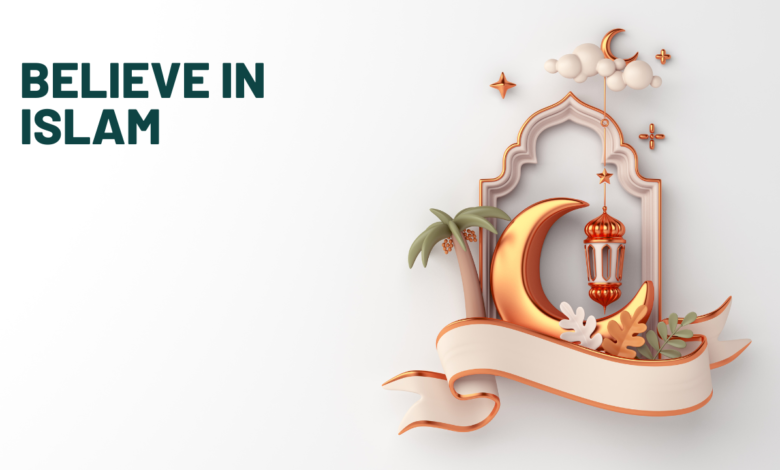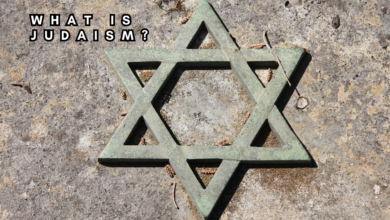Believe in Islam
The Power of Belief in Islam: Strengthening Faith and Building a Fulfilling Life

Believe in Islam
The fundamental belief in Islam is the belief in the oneness of God, known as Tawhid, and the acceptance of Muhammad as the final messenger of God, as expressed in the Shahada.

Introduction
Belief is a fundamental cornerstone of Islam. It is the driving force that guides the actions and thoughts of Muslims, shaping their daily lives and their ultimate destiny. In Islam, belief is more than a mere intellectual acceptance of a set of doctrines; it is a profound and transformative experience that touches every aspect of a believer’s existence. This article explores the concept of belief in Islam, its significance, and its role in shaping the lives of millions of Muslims around the world.
The Pillars of Belief in Islam
In Islam, belief is articulated through the Shahada, the declaration of faith. It is a concise statement that encapsulates the core tenets of Islamic belief: “There is no god but Allah, and Muhammad is His Messenger.” This simple yet profound declaration serves as the foundation of Islamic faith, acknowledging the oneness of God and the prophethood of Muhammad.
- Tawhid (Oneness of God): The first part of the Shahada, “There is no god but Allah,” is a declaration of the oneness of God. Muslims believe in the absolute unity and uniqueness of Allah, emphasizing that there is no deity worthy of worship except Him.
- Risalah (Prophethood): The second part of the Shahada, “Muhammad is His Messenger,” acknowledges the prophethood of Muhammad. Muslims believe that God chose Muhammad as His final messenger to guide humanity, conveying His message and exemplifying how to live a righteous life.
Also check.
- What is Quran?
- What is Haram?
- Who is the Current Caliph of Islam?
- What does Muslims Believe in?
- What Is a Christian?
Belief in the Oneness of God
Belief in the oneness of God, known as Tawhid, is the central concept in Islamic theology. It serves as the cornerstone of a Muslim’s faith and shapes their worldview. Tawhid underscores the idea that Allah is the creator, sustainer, and the only entity worthy of worship. Believing in the oneness of God cultivates a profound sense of purpose, meaning, and dependence on the Divine in the life of a Muslim. This belief leads to a profound sense of gratitude, humility, and a constant striving for righteousness.
The Role of Belief in Shaping Character
Belief in Islam goes beyond mere intellectual assent; it has a profound impact on an individual’s character and actions. Muslims believe that their faith should manifest in their everyday lives, shaping their behavior and moral conduct. The Quran and Hadith (sayings and actions of the Prophet Muhammad) provide guidance on how to embody this belief. Muslims are encouraged to be honest, compassionate, just, and charitable. The belief in the afterlife, where individuals will be held accountable for their actions, serves as a powerful motivator to act in accordance with the teachings of Islam.
Belief in the Life Hereafter
Muslims believe in the concept of the life hereafter, where each individual will be rewarded or punished based on their deeds in this world. This belief in the Day of Judgment serves as a source of comfort and hope for the righteous and a warning for those who stray from the path of faith. The belief in the hereafter encourages Muslims to lead a life of integrity, seeking forgiveness for their sins and striving to be just and compassionate in their dealings with others.
Belief in Islam: A Source of Strength
For Muslims, belief is not just an abstract concept; it is a source of strength and resilience. It provides comfort in times of adversity, guidance in moments of doubt, and a sense of purpose in daily life. Faith helps individuals navigate the challenges of the world with patience and trust in the Divine plan. It fosters a sense of community, as Muslims come together to worship, support one another, and serve the greater good.
Conclusion
Belief in Islam is not limited to a set of dogmas; it is a profound and transformative experience that touches every aspect of a believer’s life. The belief in the oneness of God, the prophethood of Muhammad, the importance of good character, and the concept of the hereafter form the foundation of Islamic faith. These beliefs guide Muslims in their daily lives, influencing their choices, actions, and interactions with others. In a world filled with challenges and uncertainties, belief in Islam provides strength, purpose, and a profound sense of connection to the Divine for millions of people around the world.

FAQs
What is the fundamental belief in Islam?
The fundamental belief in Islam is the belief in the oneness of God, known as Tawhid, and the acceptance of Muhammad as the final messenger of God, as expressed in the Shahada.
What is the Shahada, and why is it important?
The Shahada is the declaration of faith in Islam, proclaiming the oneness of God and the prophethood of Muhammad. It is crucial because it serves as the foundation of Islamic belief and defines one as a Muslim.
How does belief in Tawhid shape the life of a Muslim?
Belief in Tawhid emphasizes the unity and uniqueness of God. It shapes a Muslim’s worldview, fostering gratitude, humility, and a sense of dependence on the Divine.
How does belief in Islam influence one’s character and behavior?
Belief in Islam encourages honesty, compassion, justice, and charity. Muslims strive to embody these qualities in their daily lives, guided by the teachings of the Quran and Hadith.
What is the significance of belief in the life hereafter (Day of Judgment)?
Muslims believe in the Day of Judgment, where individuals will be held accountable for their deeds. This belief motivates them to live a righteous life and seek forgiveness for their sins.
How does belief in Islam provide strength and comfort in difficult times?
Belief in Islam offers comfort and strength in adversity by providing a sense of purpose, trust in the Divine plan, and the belief in God’s support during challenging moments.




